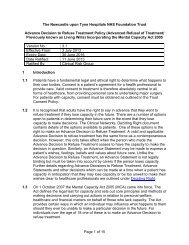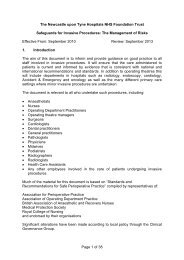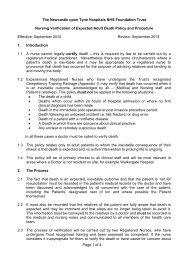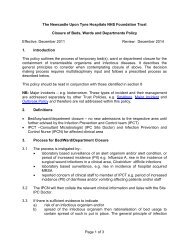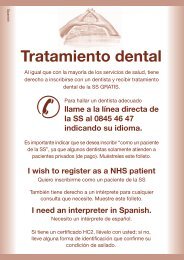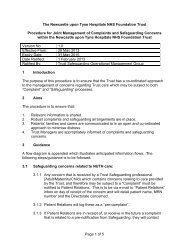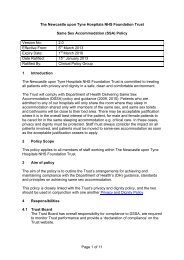15 Nursing Quality Strategy - 56KB [PDF] - Newcastle Hospitals
15 Nursing Quality Strategy - 56KB [PDF] - Newcastle Hospitals
15 Nursing Quality Strategy - 56KB [PDF] - Newcastle Hospitals
You also want an ePaper? Increase the reach of your titles
YUMPU automatically turns print PDFs into web optimized ePapers that Google loves.
THE NEWCASTLE UPON TYNE HOSPITALS NHS FOUNDATION TRUST<br />
COUNCIL OF GOVERNORS<br />
Agenda item 13<br />
Paper O<br />
NURSING QUALITY STRATEGY<br />
Report Purpose:<br />
Decision / Approval<br />
Discussion<br />
Information<br />
<br />
Brief description of the item and any significant issues:<br />
This paper presents the <strong>Nursing</strong> <strong>Quality</strong> <strong>Strategy</strong>, which was approved by the<br />
Board of Directors on 22 nd October 2008.
THE NEWCASTLE UPON TYNE HOSPITALS NHS FOUNDATION TRUST<br />
NURSING AND MIDWIFERY QUALITY IMPROVEMENT STRATEGY<br />
“I CARE 2”<br />
EXECUTIVE SUMMARY<br />
This paper sets out a strategy to improve the quality of <strong>Nursing</strong> and Midwifery care<br />
within the Trust. In doing so it recognises the excellent, but often “invisible” care<br />
given to our patients as well as the many developments and improvements over<br />
the last three years.<br />
This strategy will deliver a programme of projects to help nurses and midwives<br />
make changes to provide nursing and midwifery care at its very best to every<br />
patient every time. It will build upon the traditions and values of nursing and<br />
midwifery while focusing on the delivery of high quality care within today’s dynamic<br />
and challenging environment.<br />
The <strong>Strategy</strong> focuses on three strands of work:<br />
• Preparing to Care<br />
• Delivering Care<br />
• Leading Care<br />
This will cover the career pathway of nurses and midwives within our organisation<br />
and ensure not only continuity but also ongoing development as the strands build<br />
on one and other.<br />
Across the three strands of care we will embed a simple message for all nursing<br />
and midwifery staff to incorporate into their everyday work, known as I CARE 2.<br />
Given the size of the nursing and midwifery workforce and the scale of the<br />
proposals the support of a project nurse is requested to ensure timely delivery of<br />
the strategy.<br />
Melanie Hornett<br />
<strong>Nursing</strong> & Patient Services Director<br />
14 th November 2008
THE NEWCASTLE UPON TYNE HOSPITALS NHS FOUNDATION TRUST<br />
NURSING AND MIDWIFERY QUALITY IMPROVEMENT STRATEGY<br />
“I CARE 2”<br />
1. BACKGROUND<br />
The context for the delivery of <strong>Nursing</strong> and Midwifery care is increasingly complex,<br />
technical and specialist, with more regulation and inspection. We face greater demands<br />
and expectations from patients, their families and the public, and the profile of the<br />
nursing and midwifery workforce is increasingly diverse with staff themselves having<br />
very different expectations about their role and contribution.<br />
Despite these changes the essentials remain the same. Patients and the public want<br />
safe and effective essential care and a professional approach - courtesy, respect and<br />
above all kindness- “a personal touch”. In this context “essential care” incorporates<br />
caring for patients’ privacy and dignity, personal hygiene, toileting needs, nutritional<br />
needs, preventing complications of care and treatment such as pressure sores,<br />
maintaining a safe environment and ensuring effective communication.<br />
Nurses and Midwives are the main front line workers in our hospitals and we know that<br />
the way in which they deliver care and interact with patients forms a fundamental part of<br />
the overall healthcare experience. Higher numbers of registered nurses in acute care is<br />
also associated with decreasing patient mortality, lower numbers of healthcare acquired<br />
respiratory, wound and urinary tract infections, a decrease in falls and medication<br />
errors, greater patient functional independence, faster recovery and rehabilitation as<br />
well as a better experience of health and health care (Wert, Rafferty,and Lankshear<br />
2005).<br />
Nurses and Midwives want to be able to spend their time giving direct patient care, be<br />
recognised for their contribution to care and treatment as well as to the organisation,<br />
have flexible working arrangements, good pastoral support and access to education,<br />
training and development.<br />
2. WHAT HAVE WE BEEN DOING OVER THE LAST THREE YEARS?<br />
Over the last three years significant change and development has helped to improve<br />
and strengthen <strong>Nursing</strong> and Midwifery across the Trust around the central themes<br />
outlined in the <strong>Nursing</strong> <strong>Strategy</strong> of:<br />
• Improving Patient Care<br />
• Communication<br />
• <strong>Nursing</strong> Leadership<br />
• Education & Practice Development<br />
Of particular importance has been work around<br />
• Being with Patients – focusing staff on the needs of patients to feel cared for and<br />
cared about<br />
1
• The Productive Ward – introducing ward based staff to front line service<br />
improvements<br />
• Ward Accreditation Scheme – providing an infection prevention and control<br />
assurance framework at ward level<br />
• <strong>Nursing</strong> <strong>Quality</strong> Indicators – demonstrating the quality of care at ward level<br />
• Strengthening the role of sisters/charge nurses – developing leadership at ward<br />
level to ensure an improved patient experience, safe and effective care, positive<br />
team working and alignment with Trust objectives.<br />
The impact of this work can be evidenced by<br />
• Increased engagement with sisters/charge nurses and matrons<br />
• Improved clarity re role expectations<br />
• Improved environments for care (Ward Accreditation Scheme)<br />
• <strong>Nursing</strong> <strong>Quality</strong> Indicators<br />
It is however often hard to measure “good nursing”. Patients provide the best measure –<br />
they know when they have received good nursing care and when they have not.<br />
However there is still much to do to ensure consistency and continuous improvement in<br />
achieving positive patient experience, safe and effective care, and a dynamic and<br />
focused nursing and midwifery workforce.<br />
3. MOVING FORWARD<br />
This paper outlines a <strong>Nursing</strong> and Midwifery improvement strategy for the next three<br />
years. This strategy will deliver a programme of projects to help nurses and midwives<br />
make changes to provide nursing and midwifery care at its very best to every patient<br />
every time. It will build upon the traditions and values of nursing and midwifery while<br />
focusing on the delivery of high quality care within today’s dynamic and challenging<br />
environment.<br />
While the strategy focuses on the <strong>Nursing</strong> and Midwifery workforce, in terms of its<br />
process, the objective is very clearly about the impact this has on patients and patient<br />
care. We will work closely with patient representatives to ensure we meet their needs<br />
above our own.<br />
While focusing this work on nurses and midwives we also recognise that healthcare is<br />
very much about team work and where ever possible we will work with our colleagues<br />
from other staff groups and organisations to gain insight support and feedback.<br />
The strategy will build be on our strengths and compliment work ongoing in the Trust. Its<br />
aim will be to ensure every nurse, midwife or health care assistant understands their<br />
role in delivering patient care and works to improve that delivery every day to every<br />
patient, every time.<br />
The emphasis will be on engaging all nursing and midwifery staff, using small changes<br />
to drive improvement locally and learning from mistakes.<br />
2
4. DELIVERING THE STRATEGY<br />
The delivery of this strategy will be through a programme of projects focused on three<br />
strands:<br />
• Preparing to Care<br />
• Delivering Care<br />
• Leading Care<br />
This will cover the career pathway of nurses and midwives within our organisation and<br />
ensure not only continuity but also ongoing development as the strands build on one<br />
and other.<br />
Across the three strands of care we will embed a simple message for all nursing and<br />
midwifery staff to incorporate into their everyday work:-<br />
I CARE 2<br />
Introduce yourself<br />
Care as you would want to be cared for<br />
Ask “What else can I do for you?”<br />
Respect privacy and dignity<br />
Empathise when things don’t go as planned<br />
2 minutes sitting at every patient’s bedside every day<br />
4.1 Preparing to Care<br />
Setting the scene in terms of our expectations of patient care and nursing practice<br />
for new students and new recruits is the foundation for good practice. This strand of<br />
the strategy will focus on students and new recruits (Registered Nurses/ Midwives<br />
and Healthcare Assistants).<br />
Action will focus on:<br />
• Working with Northumbria University to increase our involvement and interaction<br />
with students during their pre registration training.<br />
• Enhancing the Trust “Welcome Day” for students as they join their pre<br />
registration programme.<br />
• Developing fast track recruitment processes for newly qualified students.<br />
• Develop a bespoke <strong>Nursing</strong> and Midwifery Induction Day – to include general<br />
information, assessment of essential skills and a focus on the values of <strong>Nursing</strong><br />
and Midwifery in <strong>Newcastle</strong>.<br />
• Review current preceptorship programmes to include three study days within the<br />
first year to emphasize key areas of patient care and nursing accountability.<br />
3
• Develop parallel work for new healthcare assistants focusing on recruitment,<br />
induction, in house training, preceptorship and support.<br />
4.2 Delivering Care<br />
Building on registration and induction is key in terms of consolidating good practice and<br />
establishing continuous professional development and retaining a focus on what<br />
matters to patients. This strand of work will focus on the largest staff group and key<br />
skills of communication, essential care and service improvement underpinned by<br />
education and training in the class room and especially at the bed side.<br />
• Develop a competence framework for generic skills for registered nurses and<br />
midwives and health care assistants.<br />
• Continue the roll out of “Being with Patients” to include all nursing and midwifery<br />
staff.<br />
• Develop one day bespoke training for all band 2, 3 and 5 staff to promote the<br />
importance of safe clean and comfortable hospital environment.<br />
• Entrench service improvement at the bedside through the introduction of TCAB,<br />
(Transforming Care at the Bedside) based on methodologies developed by the<br />
Institute of Healthcare Improvement and implemented across the USA. TCAB<br />
also provided the source for “The Productive Ward” and so will allow further<br />
development of that concept.<br />
• Introduce “Above and Beyond” a patient nominated recognition programme for<br />
individuals who have gone above and beyond the call of duty in their daily work.<br />
• Further refine the Knowledge and Skills Framework (KSF), its link with appraisal<br />
and the support and feedback systems of individuals in relation to their personal<br />
development.<br />
• Review current in house and external provision of education and training for<br />
nurses and midwives to ensure it is fit for purpose and value for money.<br />
4.3 Leading Care<br />
The role of sisters and charge nurses in leading their teams is pivotal to a positive<br />
patient experience and outcome. Work has already focused on the fundamentals of this<br />
role and through this strand will be extended in terms of depth in relation to<br />
sisters/charge nurses and matrons and breadth in terms of others who “take charge”.<br />
Actions will focus on:<br />
• Introduce a development programme for nurses and midwives at bands 5 and 6<br />
who are “in charge” on an infrequent basis (once or twice a week or less).<br />
• Introduce a succession planning scheme by application to develop nurses and<br />
midwives with an interest and ability in a career in senior positions.<br />
4
• Continue with Sister/Charge Nurse Development Programme, including<br />
360degree assessment, individual review and objective setting as well as Stage<br />
2 of the taught programme.<br />
• Continue with Matrons Master classes, including 360degree assessment,<br />
individual review and objective setting as well as Stage 2 of the taught<br />
programme.<br />
• Further review the matron role to ensure synergy with patient, professional and<br />
Trust objectives.<br />
• Develop a process for the identification of “Beacon” wards and share learning<br />
from those areas with others.<br />
• Continue to develop the <strong>Nursing</strong> <strong>Quality</strong> Indicators, the Ward Accreditation<br />
Programme and the Nurse staffing Review methodology to improve access to<br />
comparative performance data at ward level.<br />
4.4 Monitoring and Evaluation<br />
The programme will be led by the <strong>Nursing</strong> and Patient Service Director and managed<br />
via the <strong>Nursing</strong> and Midwifery Advisory Group. Each specific project will be developed<br />
in detail with appropriate time scales and outcome measurements<br />
4.5 Timescales<br />
The overall timescale envisaged is two years from January 2009.<br />
4.6 Costs<br />
To facilitate the programme 1wte band 7 nurse would be required to join the <strong>Nursing</strong><br />
and Patient Services team for the next two years (£40,000). This post holder would<br />
coordinate the delivery of the strategy. Administrative support will be absorbed by<br />
current resources.<br />
The most substantial costs relate to the funding of the “Being with Patients” sessions<br />
(approximately £86k).<br />
Other costs will be met from the <strong>Nursing</strong> Education budget and Directorates will need to<br />
cover the impact of releasing staff for training. On completion of more detailed project<br />
plans approval for these costs will be sought via the <strong>Nursing</strong> education budget and if<br />
necessary via the Executive Team.<br />
Melanie Hornett<br />
<strong>Nursing</strong> & Patient Services Director<br />
14 th November 2008<br />
5
Every Patient….Every Time<br />
Leading Care<br />
Delivering Care<br />
Preparing to Care<br />
Pre Registration<br />
Induction Preceptorship The<br />
Competent<br />
Practitioner<br />
Clinical<br />
Leaders<br />
Assuring<br />
Standards<br />
Advancing<br />
Practice<br />
Work with<br />
Northumbria<br />
University<br />
New Registrants<br />
Band 5/6<br />
Bands 6/7/8<br />
Mainly S/CN<br />
Matrons<br />
HCA<br />
Impact of NMC<br />
New HCAs<br />
Clinical<br />
Academic<br />
Careers<br />
6


![15 Nursing Quality Strategy - 56KB [PDF] - Newcastle Hospitals](https://img.yumpu.com/29663524/1/500x640/15-nursing-quality-strategy-56kb-pdf-newcastle-hospitals.jpg)
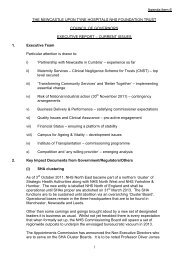
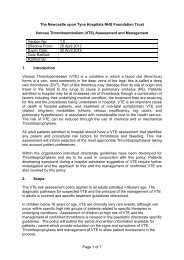
![Standard Precautions Policy - 112KB [PDF] - Newcastle Hospitals](https://img.yumpu.com/51150129/1/184x260/standard-precautions-policy-112kb-pdf-newcastle-hospitals.jpg?quality=85)
![Oxygen Management Policy - 38KB [PDF] - Newcastle Hospitals](https://img.yumpu.com/50798872/1/184x260/oxygen-management-policy-38kb-pdf-newcastle-hospitals.jpg?quality=85)
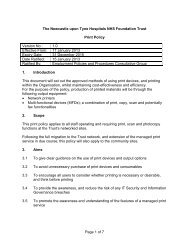
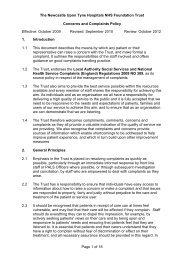
![Patient Identification Policy - 130KB [PDF] - Newcastle Hospitals](https://img.yumpu.com/49156101/1/190x245/patient-identification-policy-130kb-pdf-newcastle-hospitals.jpg?quality=85)
